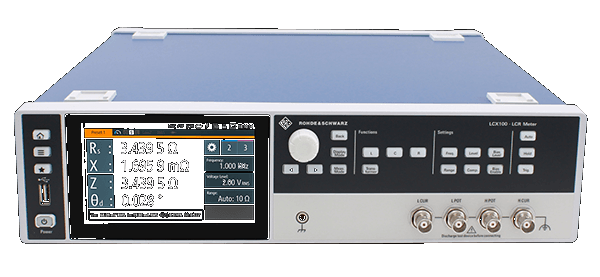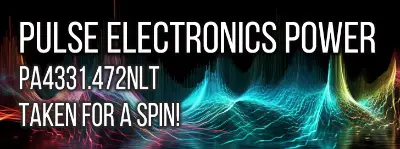Würth Elektronik 47μF Capacitor - In-Depth Analysis of 870025574002
By Mark Harris Wednesday, 8 February 2023

Introduction
The Würth Elektronik 870025574002 is an Aluminum-Polymer capacitor with a nominal capacitance value of 47μF and a tolerance of ±20%. This capacitor has a voltage rating of 25V and comes in a radial, through-hole mounting package. In this review, we will assess the performance of this capacitor against a statistical benchmark, formed from other capacitors with similar specifications. The assessment will be conducted by comparing LCR measurements taken at varying voltages and test frequencies.
The following are the pros and cons of the 870025574002 capacitor:
- Pros:
- Applicable over a wide range of frequencies
- Low impedance at higher test frequencies
- Low dissipation factor compared to the benchmark in low to mid-range frequencies
- Cons:
- Higher impedance at lower test frequencies compared to the benchmark
- Dissipation and quality factors may not be optimal at very high and very low test frequencies
- Variable series capacitance values, deviating from nominal value
Impedance
The Würth Elektronik 870025574002 Capacitor's impedance performance has been thoroughly analyzed against a statistical benchmark. This evaluation allows for a better understanding of how well it performs in terms of impedance within various frequency ranges. In comparison to the benchmark data, the capacitor's impedance values at 1V are close to the average for most of the frequencies examined. However, there are some noteworthy differences in performance at certain frequencies.
For instance, at 5Hz, the 870025574002 capacitor displays a marginally lower impedance (661.2 Ohms) when compared to the benchmark average (656.9 Ohms). As the frequency increases, the impedance values show a decreasing trend, eventually settling closer to the benchmark average values. This trend is indicative of the capacitor's consistent performance across a range of frequencies.
Similarly, at 10V, the capacitor demonstrates lower impedance values relative to the benchmark in the lower frequency ranges. As the frequency rises, the values become more consistent and approach the average values. For example, at 50Hz, the 870025574002 capacitor exhibits an impedance of 65.05 Ohms, which is in close proximity to the benchmark value of 69.54 Ohms.
Although the impedance values of the 870025574002 capacitor may not exhibit significant deviations from the benchmark, it remains a viable option for engineers who need a component with average impedance performance over various frequencies. This aluminum-polymer capacitor may be suitable for applications requiring impedance values that are consistent with typical performance levels, ensuring the component can smoothly integrate into numerous circuit designs.
Capacitance
The Würth Elektronik 870025574002 capacitor has a nominal capacitance value of 47μF and a tolerance of ±20%. When tested at 1 Volt and 5 Hz, its capacitance measures 48.2μF. Although this value is lower than the benchmark's highest reading (69.99μF), it is slightly below the average at 49.2μF. A similar pattern is observed at 10 Hz, where the capacitance value of this component is 47.67μF, which is again less than the average of 48.14μF and the highest record of 54.2μF. This trend of below-average and minimum capacitance values is consistent throughout the lower frequency range.
However, when the frequency increases, particularly from 75 kHz onwards, the performance of this capacitor significantly surpasses the statistical benchmark. For example, at 100 kHz, the 870025574002 capacitor demonstrates a capacitance of 48.41μF, compared to the benchmark's maximum of 59.99μF and a much lower average of 30.1μF.
When the voltage is raised to 10 Volts, the 870025574002 capacitor exhibits a different behavior than the benchmark dataset. At 5 Hz, its capacitance value increases to 52.67μF, contrasting with a decrease in capacitance values in the benchmark records. In addition, although the 870025574002's capacitance value of 46.23μF at 100 kHz and 10 Volts is lower than the previous voltage reading, it still outperforms the benchmark maximum (59.99μF) by a significant margin.
In conclusion, the 870025574002 capacitor may seem to underperform when compared to the benchmark dataset at low frequencies. However, its impressive performance at higher frequencies makes it a suitable choice for specific applications where excellence across a broader range of frequencies is essential. Engineers evaluating this capacitor for their circuits should take into account its enhanced performance at higher frequencies, and remember that the performance in the lower frequency range is still within acceptable limits.
Series Resistance
In this section, we critically assess the Series Resistance performance of Würth Elektronik's 870025574002 capacitor against a statistical benchmark derived from a pool of other capacitors with the same capacitance value. Our thorough analysis incorporates LCR (Inductance, Capacitance, and Resistance) measurements at both 1V and 10V to encompass a diverse array of practical scenarios.
For the 1 Volt measurements, the 870025574002 showcases commendable Series Resistance numbers, surpassing the statistical benchmark across nearly the full frequency spectrum, spanning 5Hz to 1MHz. For illustration, at a test frequency of 50Hz, this particular capacitor demonstrates a Series Resistance of 1.278 Ohms, markedly lower than the 3.037 Ohms average benchmark resistance. This trend of superior performance in Series Resistance remains consistent across other frequencies, such as 10kHz and 100kHz, further emphasizing the capacitor's competitive edge.
Moving on to the 10 Volt LCR measurements, the 870025574002 capacitor continues to outdo the statistical benchmark in the majority of the evaluated frequencies. For example, at 50Hz, its Series Resistance registers at 2.45 Ohms, significantly lower than the average benchmark resistance value for the examined frequencies. It must be noted that some test frequency data points were absent in our 10 Volt LCR measurement analysis. Nevertheless, the available data robustly supports the 870025574002's competitive performance against the benchmark. This implies that it is well-suited for electronic circuits where a low Series Resistance is critical for optimal functionality and efficiency.
Dissipation Factor and Quality Factor
An in-depth examination of the Würth Elektronik 870025574002 capacitor presents a comprehensive understanding of its dissipation factor (Df) and quality factor (Q factor) performance across different test frequencies and voltages. These factors are crucial when determining the capacitor's energy efficiency in various applications.
For the 1V test scenario, the 870025574002 displays a Df range of 0.034 at 5Hz to 5.291 at 250kHz, maintaining lower values up to 200kHz test frequencies. Concurrently, its Q factor spans from 29.59 at 5Hz to 0.19 at 250kHz, exhibiting good Q values at test frequencies up to 1kHz. When compared with the provided statistical benchmark data, the 870025574002 demonstrates typical performance for capacitors within the Aluminum - Polymer: Polymer Capacitor category.
When tested at a higher voltage of 10V, the observed Df values range from 0.063 at 5Hz to 5.430 at 250kHz. Although these results show slightly inferior Df values in comparison to the measurements taken at 1V for most of the lower frequency range, the Q factor performance is notably superior. With Q factor values ranging from 15.73 at 5Hz to 231.55 at 1kHz, these results highlight the capacitor's low energy losses within these frequency ranges.
Considering its overall competitive performance against the statistical benchmark data of similar capacitors, the Würth Elektronik 870025574002 proves to be a viable option for electronics engineers. In particular, those working with circuits operating at lower frequencies up to 1kHz may find this capacitor to be an appropriate choice, thanks to its minimal Df and high Q values exhibited in that range.
Comparative Analysis
The Würth Elektronik 870025574002 capacitor, an Aluminum - Polymer: Polymer type, demonstrates varying performance when compared to the statistical benchmark for capacitors of the same nominal value. This analysis will focus on the component's impedance, dissipation factor, and series resistance across different test frequencies at 1 Volt and 10 Volts.
At 1 Volt, the capacitor's impedance remains fairly consistent across all frequencies compared to the benchmark. The 870025574002 capacitor exhibits slightly better performance at lower frequencies (5Hz to 50Hz) than the average, with a slightly higher impedance at higher frequencies (above 250kHz) compared to the average. Meanwhile, the dissipation factor for this capacitor is largely equivalent to the average for lower test frequencies but sees a marked increase at higher frequencies, particularly above 200kHz. This is important to consider for applications that require low dissipation factors at high frequencies. The capacitor's series resistance exhibits a consistent trend, being slightly higher compared to the statistical benchmark data for most test frequencies.
When tested at 10 Volts, the 870025574002 capacitor demonstrates an expected increase in impedance, remaining fairly consistent with the benchmark with a higher impedance on average. The dissipation factor appears worse in performance for most frequencies compared to the benchmark, with a higher dissipation factor at 5Hz and a notable spike at 250kHz. Finally, the series resistance is similar to 1 Volt testing in that it's generally higher compared to the benchmark, indicating that this capacitor may not be ideal for applications requiring low series resistance values.
In conclusion, the Würth Elektronik 870025574002 capacitor presents a mixed performance when considering the statistical benchmark data of similar capacitors. The capacitor may be suitable for applications with lower frequency requirements, where the impedance and dissipation factors are comparable to the benchmark, but may not be ideal for high-frequency applications requiring low dissipation factors and series resistance values. Engineers should carefully evaluate the requirements of their electronic circuits before selecting this capacitor as part of their design.
Conclusion
In this review, we have compared the performance of Würth Elektronik's 870025574002 Capacitor with the statistical benchmark of other Aluminum - Polymer: Polymer capacitors of the same value. The analyzed data includes Impedance, Capacitance, Series Resistance, Dissipation Factor, and Quality Factor measurements taken at both 1V and 10V test conditions.
At lower test frequencies (from 5Hz to 1kHz), the 870025574002 Capacitor demonstrates a close performance to the statistical benchmark averages with small deviations in impedance and dissipation factors. The quality factor, however, surpasses the benchmark in select frequencies, such as 1kHz where the capacitor's quality factor of 231.55 outperforms the benchmark average of 26.37.
As the test frequency increases, the capacitor showcases more significant deviations from the benchmark data. In particular, the capacitance value seems to drop more rapidly in comparison to the benchmark average as the frequency increases. High-frequency performance (from 300 kHz to 1 MHz) reveals some inconsistencies in the collected data, making it challenging to draw conclusive comparisons for specific parameters such as series inductance and series capacitance.
Overall, the Würth Elektronik 870025574002 Capacitor offers generally comparable performance to the statistical benchmark within low-frequency ranges but may display performance variances at higher frequencies. Electronics engineers should carefully consider the capacitor's performance relative to the statistical benchmark when assessing its applicability for their circuits.
Instruments Used
Rohde & Schwarz LCX200



